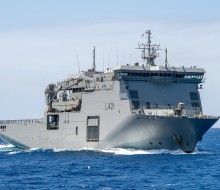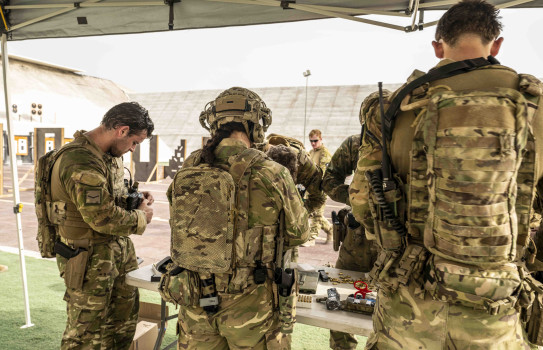
Royal New Zealand Navy’s HMNZS Canterbury departs for mission to Tokelau
07 February 2026
Unfortunately you are viewing this website on an outdated browser which does not support the necessary features for us to provide an adequate experience. Please switch to a modern browser such as latest version of Google Chrome, Mozilla Firefox, Apple Safari or Microsoft Edge.
Ngā mihi nui
The New Zealand Defence Force’s recent deployment to the Middle East included a member of a team specifically trained to engage with vulnerable people, a mission-critical role on operations like this.
Women, children and the elderly are among those most affected during conflict or times of crisis.
When deploying on operations, the NZDF may deploy members of its specialist Female Engagement Team (FET), who are playing an increasingly vital role in advancing the NZDF’s commitment to United Nations Security Council resolutions on Women, Peace and Security (WPS) — both in operational environments and across interagency coordination.
The FET capability is designed to engage with vulnerable populations in complex environments, providing trained personnel who can respond to a wide range of sensitive scenarios including displacement, protection, and trauma. While the name may suggest a gender-specific focus, the work is broader.
A FET member, who was recently deployed to the Middle East, said the role was centred on supporting vulnerable people, "not just women and children, but also the elderly and others who may be affected during crises or conflict”.

The member of the Female Engagement Team training with NZ Army personnel in the Middle East.
FET operators have the training to operate in environments where cultural norms or legal obligations require gender-specific support — such as conducting searches, managing holding areas and advising on segregation measures. This ensures NZDF operations are carried out respectfully and in accordance with both international law and cultural expectations.
“In many regions, it’s not appropriate — or even legal — for male personnel to search female civilians. Our presence helps ensure those requirements are met.”
FET operators also work alongside agency partners, such as the Ministry of Foreign Affairs and Trade (MFAT), to support humanitarian objectives and coordinate protection-focused advice. The team’s role is operational but also requires a strategic understanding of policy and mission objectives.
Becoming part of a FET requires a high level of physical fitness, psychological resilience and interpersonal skills. Personnel undergo a rigorous selection and assessment process, including scenario-based testing, negotiation and escalation management, and cross-cultural training.
“We’re expected to perform under pressure, and to maintain composure when others are relying on us for guidance and support.”
Supplies for families are taken by the NZDF when deploying on operations to evacuate civilians from areas affected by conflict or crisis.
The team is trained to adapt to a variety of environments, and in different regions – from the Middle East to the Pacific and beyond.
“We train to be deployable anywhere, and to support any operation where our skills are needed.”
FET personnel often serve as a trusted point of contact for both civilians and military personnel. Their presence can support de-escalation, improve mission understanding, and ensure vulnerable populations are treated with dignity and respect.
“People are more likely to disclose sensitive information or seek help when they feel safe. That trust is a key part of what we bring to the mission.”
“We are not just there to observe. We are trained, capable, and mission-critical.”